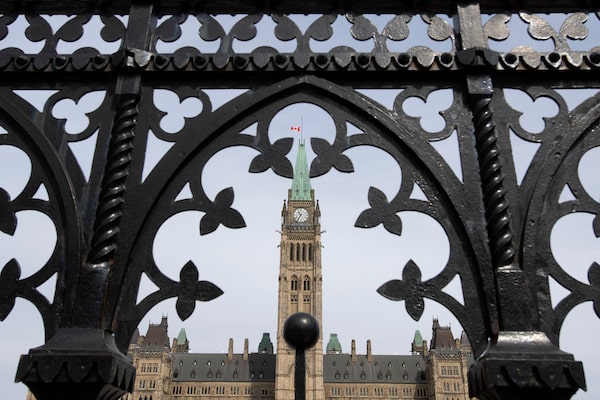
The Parliament buildings are seen in Ottawa, on April 27, 2020.Adrian Wyld/The Canadian Press
Sign up for the Coronavirus Update newsletter to read the day’s essential coronavirus news, features and explainers written by Globe reporters and editors.
The federal government is planning to legislate fines and jail time for people who submit fraudulent claims under the Canada Emergency Response Benefit, a $60-billion program that provides income support to workers affected by the pandemic.
The changes are in a draft bill obtained by The Globe and Mail that has not yet been introduced in the minority Parliament, where the Liberals will need the support of at least one other major opposition party for it to become law.
The initial CERB legislation was largely silent on potential consequences for fraud beyond a statement that erroneous payments would have to be returned to the government. The draft bill introduces terms such as “punishment” or “imprisonment” in reference to violations. It outlines a series of offences, including making false or misleading statements, failing to fully disclose all relevant income or receiving an income support payment for which a person is not eligible.
Under “punishment,” the draft bill says those guilty of an offence could receive a fine of not more than $5,000 plus not more than double the amount of the income support payment “that was or would have been paid as a result of committing the offence” or “both the fine and imprisonment for a term of not more than six months.” The bill does not say when those provisions would take effect, which suggests that section will not be enforced retroactively.
However, another section includes retroactive financial penalties of up to three times the improperly claimed amount, but no jail time. Offences under that section would apply to people who “fail to return to work when it is reasonable to do so and the employer makes a request for their return; fail to resume self-employment when it is reasonable to do so or decline a reasonable job offer when they are able to work.”
In an interview, NDP Leader Jagmeet Singh accused Prime Minister Justin Trudeau of taking a “heavy-handed” approach that will harm vulnerable Canadians and runs counter to the current public debate about inequality and the justice system.
“It’s ludicrous," he said. “Instead of making it easier for people to get back to work, making it safer for people to get back to work, he wants to scare people into work with threats of putting people in jail, during a time when we’re in a moment where we’re talking about the overincarceration of racialized people, of Black people. And these types of penalties are going to hurt the people that are the most desperate.”
Conservative MP and employment critic Dan Albas said his party has repeatedly raised concerns about fraudulent CERB claims, and is reviewing the draft bill before deciding how to respond. He said Parliament, which is suspended because of the coronavirus, should be sitting regularly so the bill can be thoroughly scrutinized.
Dan Kelly, president of the Canadian Federation of Independent Business, said the stronger language is welcome because many small-business owners are having a hard time persuading workers to return.
“While some workers are worried about returning to work for health-related reasons, many are happy to take the summer off if their income needs are taken care of through CERB," he said.
Public demand for CERB payments exceeded the government’s initial projections, and the federal cabinet must now decide how to phase out the program as businesses start to reopen.
As of June 4, the federal government has paid out $43.5-billion in CERB support. In a report last month, the Finance Department revised its projected total cost for the program from $35-billion to $60-billion. At the same time, it reduced the projected cost of the similar Canada Emergency Wage Subsidy for employers from $73-billion to $45-billion.
The CERB provides taxable income support of $2,000 for any four-week period between March 15 and Oct. 3. Applicants are required to reapply every month and attest that they are unable to work for pandemic-related reasons.
The program limits support to $8,000, or 16 weeks, which means many recipients will soon exhaust their benefits.
The draft bill does not change the 16-week maximum. A previous bill gave cabinet the power to adjust that limit through regulation.
The draft bill would change the eligibility windows, applying the measures to any four-week period between March 15 and July 5 and any two-week period between July 5 and Oct. 3.
A senior government official, who is not being identified by The Globe because they were not authorized to comment publicly on the draft bill, said the purpose of the new two-week eligibility period is to provide workers and employers with increased flexibility to cover shorter periods of time away from work.
Canadian Labour Congress president Hassan Yussuff said the government should not impose “draconian” penalties on workers.
“Penalizing workers in a pandemic, I don’t think that would be fair,” he said. “If people of course are filing fraudulent claims, by all means, the government has mechanisms to go after those individuals … but to put people in jail and to threaten them with large fines, I really don’t think that is really appropriate.”
Simon Ross, a spokesperson for Government House Leader Pablo Rodriguez, said in an e-mail that the government shared a draft bill on Saturday with opposition parties and is in discussion with “all parties to reach a consensus.”
The Speaker’s Office announced late Monday that the House of Commons will be recalled on Wednesday afternoon to deal with a government bill, setting the stage for the draft legislation to be introduced.
Sign up for the Coronavirus Update newsletter to read the day’s essential coronavirus news, features and explainers written by Globe reporters and editors.
 Bill Curry
Bill Curry